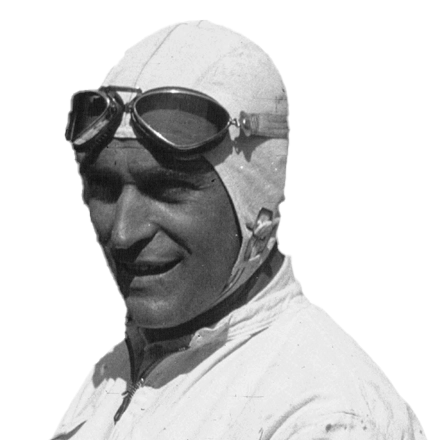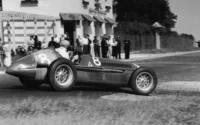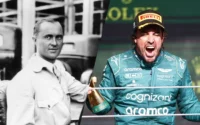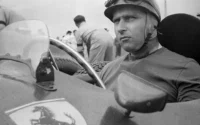Long before Formula One became the global phenomenon we know today, there was Luigi Fagioli—a fierce, fearless Italian racer born on 9 June 1898 in the mountainous region of Abruzzo. Nicknamed the “Abruzzi Robber”, Fagioli was known for his fiery temper, raw speed, and refusal to take orders from anyone—team managers included.
| Nationality | Italian |
|---|---|
| Born | Luigi Cristiano Fagioli 9 June 1898 Osimo, Ancona, Kingdom of Italy |
| Died | 20 June 1952 (aged 54) Monte Carlo, Monaco |
Fagioli’s racing career began in 1928, back in the days when goggles, grit, and guts were your main safety gear. He quickly carved out a name for himself in Grand Prix motor racing, going toe-to-toe with legends like Tazio Nuvolari and Rudolf Caracciola. He was especially successful in the AIACR European Championship, the pre-Formula One equivalent of a world championship.
In 1935, driving for Mercedes-Benz, Fagioli finished runner-up in the European Drivers’ Championship, in a season dominated by the mighty Silver Arrows. While his partnership with Mercedes brought success, it also brought friction. Fagioli wasn’t a fan of playing second fiddle, and his relationship with team orders was—let’s say—tense at best.
After World War II, many assumed his racing days were over. But not Luigi. At an age when most drivers were long retired (or long forgotten), Fagioli joined Alfa Romeo for the inaugural Formula One World Championship in 1950.
Then came his crowning moment: the 1951 French Grand Prix at Reims. In a shared drive with Juan Manuel Fangio, Fagioli co-drove the Alfa Romeo 159 to victory—at the age of 53 years, 22 days. That win made him the oldest driver ever to win a Formula One Grand Prix, one of the Oldest F1 Records That Remain Unbroken.
Formula One History Recommends
Even more astonishing? Fagioli is the only Formula One Grand Prix winner born in the 19th century. That’s right—while his rivals were born in the 1900s, Luigi had already been around when Queen Victoria was still on the throne.
He also holds a unique distinction in racing history: Fagioli is the only driver to win a championship Grand Prix in both the AIACR European Championship and the modern Formula One World Championship. He bridged two golden eras of racing—one of cigar-shaped monsters and heroic daredevils, the other of semi-organised, global motorsport.
Sadly, Fagioli’s career came to an end not long after that historic 1951 win. He passed away in 1952, while practising for the Monaco Grand Prix, which was a sport cars event that year, Fagioli crashed during practice in the tunnel. His injuries, initially believed to be minor, worsened after a few days. Fagioli died in a Monte Carlo hospital three weeks later.
Luigi Fagioli Formula One World Championship career
| F1 Career | 1950–1951 |
|---|---|
| Teams | Alfa Romeo |
| Entries | 7 |
| Championships | 0 |
| Wins | 1 |
| Podiums | 6 |
| Career points | 28 (32) |
| Pole positions | 0 |
| Fastest laps | 0 |
| First entry | 1950 British Grand Prix |
| First win | 1951 French Grand Prix |
| Last win | 1951 French Grand Prix |
| Last entry | 1951 French Grand Prix |
Luigi Fagioli Teammates
| 6 drivers | Involvement | First Year | Last Year |
|---|---|---|---|
| Reg Parnell | 1 | 1950 | |
| Gianbattista Guidotti | 1 | 1950 | |
| Giuseppe Farina | 7 | 1950 | 1951 |
| Juan Manuel Fangio | 7 | 1950 | 1951 |
| Piero Taruffi | 1 | 1950 | |
| Consalvo Sanesi | 2 | 1950 | 1951 |
Luigi Fagioli Race Wins
| Win Number | Grand Prix |
|---|---|
| 1 | 1951 French Grand Prix |
Luigi Fagioli Complete Formula One Results
| Year | Entrant | Chassis | Engine | 1 | 2 | 3 | 4 | 5 | 6 | 7 | 8 | WDC | Pts |
|---|---|---|---|---|---|---|---|---|---|---|---|---|---|
| 1950 | Alfa Romeo SpA | Alfa Romeo 158 | Alfa Romeo 158 1.5 L8 s | GBR 2 | MON Ret | 500 | SUI 2 | BEL 2 | FRA 2 | ITA 3 | 3rd | 24 (28) | |
| 1951 | Alfa Romeo SpA | Alfa Romeo 159 | Alfa Romeo 158 1.5 L8 s | SUI | 500 | BEL | FRA 1* | GBR | GER | ITA | ESP | 11th | 4 |








